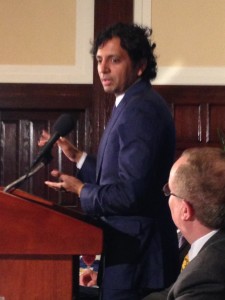M. Knight Shyamalan at the National Press Club
Posted on June 13, 2014 at 10:16 pm
 Writer/director M. Knight Shyamalan (“The Sixth Sense,” “Unbreakable,” “The Last Airbender,” “After Earth”), appeared at the National Press Club this week to talk about his side project, an intensive assessment of American schools and proposals for reform, as described in his book, I Got Schooled: The Unlikely Story of How a Moonlighting Movie Maker Learned the Five Keys to Closing America’s Education Gap
Writer/director M. Knight Shyamalan (“The Sixth Sense,” “Unbreakable,” “The Last Airbender,” “After Earth”), appeared at the National Press Club this week to talk about his side project, an intensive assessment of American schools and proposals for reform, as described in his book, I Got Schooled: The Unlikely Story of How a Moonlighting Movie Maker Learned the Five Keys to Closing America’s Education Gap. He became interested in the issue after he visited two schools just four minutes apart. In one, the students were vitally engaged and excited about all possibilities. They gathered around him, asking if they could be in his next movie. In the other, they recognized him but assumed that it could not possibly be the same man who made Hollywood films. They had already internalized the idea that no opportunities would come to them.
Shyamalan is the son of doctors. He was raised to believe in evidence and data. He spent years trying to figure out the elements that separated effective schools from failing schools and found that there were a lot of passionate adults and a lot of “heated, accusatory” arguments but very little quantifiable, replicable data. He had his own studies done and he found five core elements that were necessary for schools that made students excited about learning so that they would achieve at or beyond grade level. All five were required.
First is: principals who spend 80 percent of their time teaching teachers (“the norm is 8 percent, like a coach not coaching the players”) and the creation of “an incredibly loud and consistent culture.” He spoke frankly about the racism that is still a toxic force in the lives of children today. “They’re getting a message shouted to them outside of the school and we’re going to shout one louder.” That’s what school culture can do, especially in communicating a sense of community and possibility.
He also emphasized the importance of teachers. A good one can sustain a student despite subsequent years of mediocre teachers. But a bad one will make students lag for as much as three more years. Data must be available for continuous assessment and feedback and to create a highest common denominator by making best practices replicable. More time with the students is essential. The school day and especially the school year do not provide enough time and kids who do not have access to resources at home fall too far behind over the summer to catch up. And schools must be smaller. By itself, keeping the school to 350 or fewer raises the graduation rate 17 percent.
Shyamalan was engaged and engaging, self-deprecatory (“celebrity advocates make my stomach cringe”) but passionate. It was good to see his willingness to take on this complicated problem and be a constructive part of the solution.
